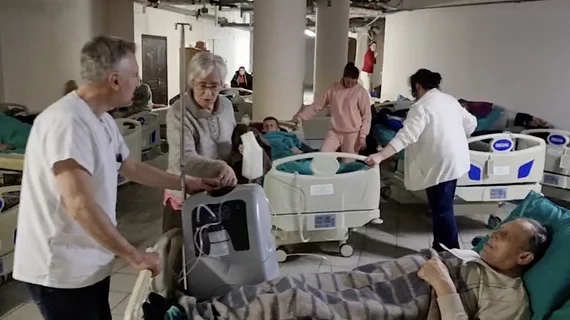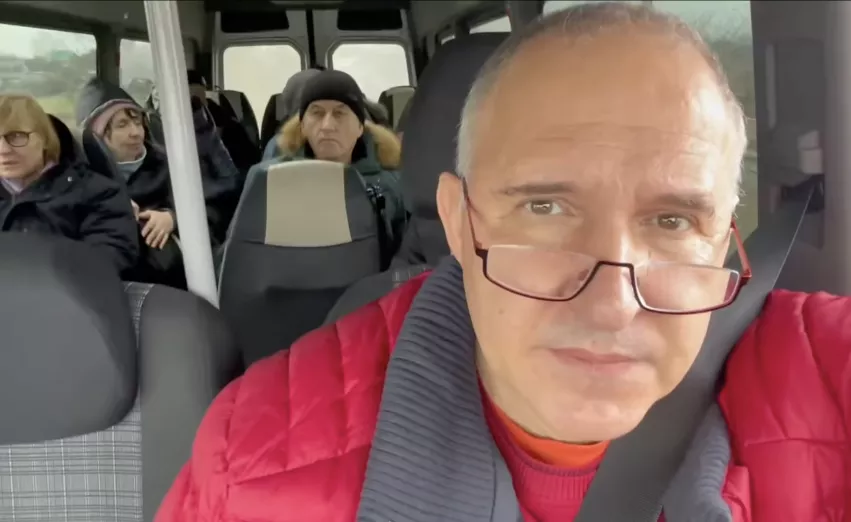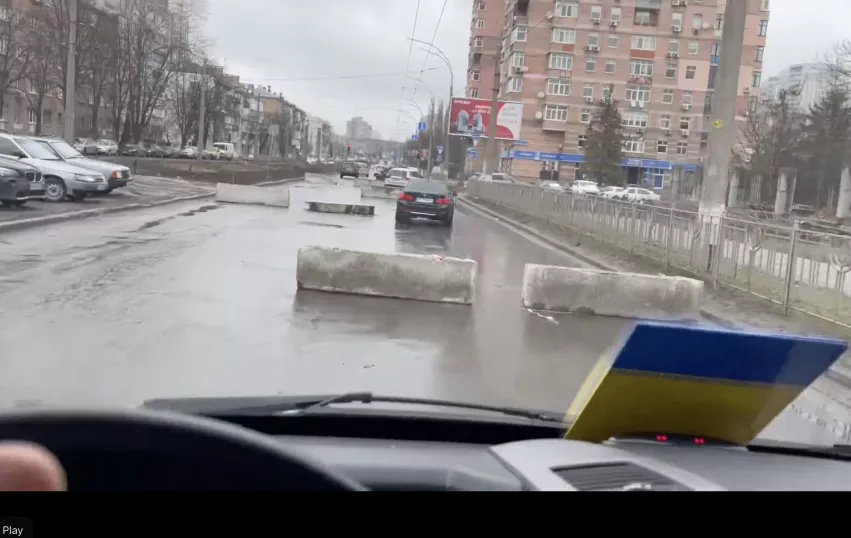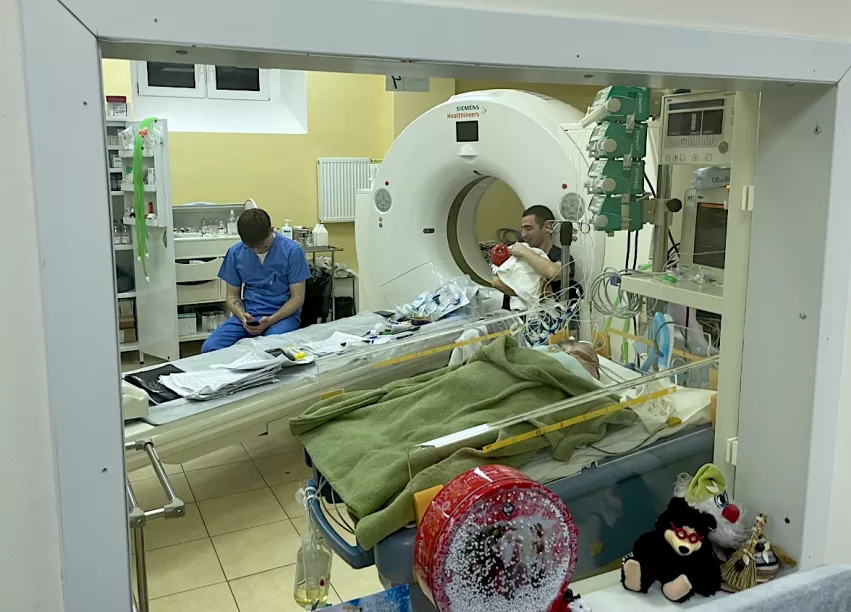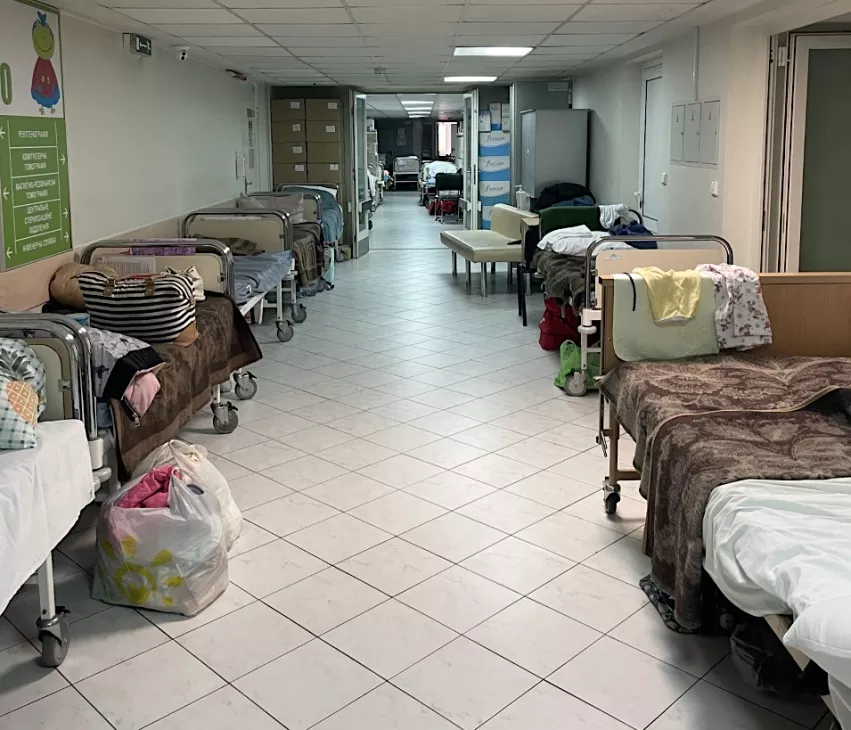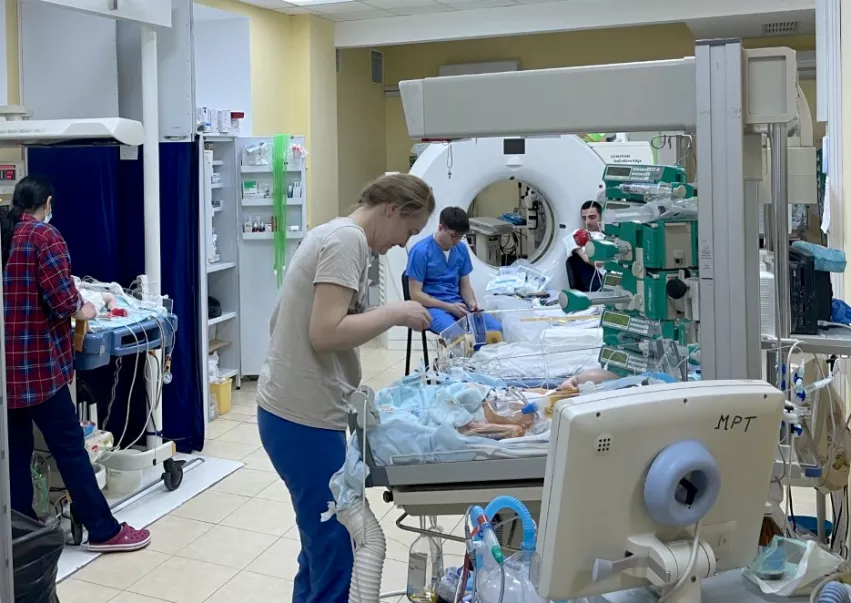Cardiac hospitals still treating patients as war in Ukraine continues
While more than 1.7 million Ukrainians are already trying to flee the country due to the ongoing Russian invasion, many physicians, including cardiologists, are staying behind. Despite the risks, they continue to treat patients and stand ready to treat the wounded in the conflict.
Several hospitals in the capital city of Kyiv are still operating as of March 7, although they report they are running low on supplies. Operations have mostly moved to the basements and bomb shelters under the hospitals because of intensified fighting, air and missile attacks on Kyiv.
"We are still treating patients in the bomb shelter," said Igor Mokryk MD, PhD, a consultant in adult and pediatric cardiothoracic surgery and chief of the department of adult cardiac surgery at the Heart Institute in Kyiv. The hospital is located about 3 miles northeast of the the city center and 4 miles from a power station that was hit by Russian attacks Feb. 25 and 26.
The hospital had to evacuate patients from its suburban hospital in Irpin, which is about two miles south of the Hostomel airport Russian forces captured during their initial invasion before Ukrainians were able to take it back. The town has been under regular Russian artillery and mortar fire for the past few days.
"In critical situations, everyone must clearly fulfill their tasks in their area of responsibility. Today, we have collected all our patients from our branch in Irpin," said Dr. Borys Todurov, director at the Heart Institute of the Ministry of Health of Ukraine in Kyiv on Facebook March 2. "These people were in the line of fire without any protection."
Todurov drove a large van full of patients from the Irpin hospital to evacuate them and posted a video of the journey on Facebook. The video shows concrete road blocks in the streets entering Kyiv designed to slow down the advance of Russian vehicles. He had to swerve back a forth dozens of times to navigate the roadway. They also passed concrete block houses constructed in the street to defend the city.
"The whole journey took five hours," he said. "The war continues, but we are holding the blow. Now the institute has 89 patients. Thanks to the staff who have been doing their job for days without leaving the clinic. Thanks to the volunteers and sponsors for their support."
Borys Todurov, director at the Heart Institute of the Ministry of Health of Ukraine, Kyiv, driving a van full of cardiac patients being evacuated from the suburb of Irpin, which came under Russian artillery fire. He shot video of the five-hour drive back to his hospital, which included check points and anti-vehicle obstacles to slow down Russian military vehicles. There is a Ukrainian flag in the front window to identify themselves as friendlies to Ukrainian troops guarding the roads through the city.
Todurov also praised his staff in a video tour of the new basement patient areas the hospital, where they moved clinical operations.
"Returned to the office with tears in my eyes because of the heroic and selfless staff. Doctors, nurses, paramedics, engineers and technicians, all have been united by the common calamity. All 98 patients are getting better, fed and clothed, but we can't discharge them yet," Todurov said.
Congenital heart surgeon fights his own war in the OR
Despite the front lines of fighting being less than 10 miles away, Dr. Oleksandr Yachnik, a congenital heart surgeon at the Scientific Practical Children's Cardiac Center in Kyiv, Ukraine, has continued to do heart surgeries on pediatric patients with serious heart conditions. The hospital is about 1.5 miles west of the city center. He posted a photo of himself on his LinkedIn page March 3 performing surgery on a 2-month-old child to correct an atrioventricular septal defect (AVSD), aortic arch hypoplasia, coarctation of aorta, and left ventricular outflow tract obstruction (LVOTO). He updated his post March 5 to say the patient has spontaneous breathing, no chest tubes, and has had no problems.
A Siemens CT scanner room being used as an improvised intensive care unit (ICU) in the basement of the Scientific Practical Children's Cardiac Center in Kyiv, Ukraine. All patients, staff and clinical operations were moved into the basement of the hospital because of intensified Russian attacks on the city in early March.
"I am pediatric cardiac surgeon and fixing congenital heart defects is what I was trained for and what I do best. This is my part, my contribution to my society’s wellbeing. War rages in our country these days, but in order for everything to function at it’s best I stay at my place and do my job," explained Yachnik. "Basically, I am living at my clinic for a week now. The one and only thing, the only reason why I have an opportunity to do, what I do best is because the other parts of our system does their best these days. It’s our military forces. These heroes do their best every day, in a way that this surprises not only us — but what is more important — our Russian enemies."
The hospital started taking treating wounded in the past week, including children that were injured in explosions and by gun fire. The hospital was also damaged by a Russian cruise missile that was shot down by Ukrainian air defenses.
"I have never seen before such unprecedented sense of community, of interconnection between every person, when all act as one, helping each other in every possible way, doing a daily exploit, forgetting any kind of disagreements in the face of common threat posed by Russia. It is these tremendous prowess and skill of our servicemen as well as daily courage and dedication of our people, what gives me not only drive, but what is more important - possibility to contribute to my society. I can now state clearly and confidently, that I’m proud to be a part of what is going on, I’m proud to be Ukrainian."
Yachnik sent Cardiovascular Business photos of the the improvised intensive care unit (ICU) in the basement over the weekend. "The ICU was transferred to the basement from its usual third floor because of constant air raids," he said.
Another photo showed the basement living area where post-operative patients and their moms are staying during patient recovery.
A photo of a baby sleeping on a mattress on the floor of the hospital basement is the staff's "adopted" baby, Yachnik said
"We have a one-month old patient, abandoned by her parents because of heart disease, which we have already treated with Norwood-Sano procedure. We basically have no place to discharge her to so she is “our” baby these days," Yachnik explained. "Almost every staff member has nursed her already. She’s very cute and already got used to being on someone’s hands constantly."
Russian cardiologists also impacted by the war
Beyond the daily economic impacts of sanctions against Russia because of the war, Russian hospitals received notice Feb. 24 from the Russian Ministry of Health to prepare to received Russian military casualties. The document indicated Russia anticipated a massive medical emergency and asked hospitals to be ready to identify medical staff ready to relocate to treat the wounded, according to British-based ITV News.
Russia also adopted a new law over the weekend that bans Russians from speaking out against the war in Ukraine and spreading "fake news." The law calls for up to 15 years in prison.
Cardiovascular Business reached out to several Russian cardiologists via Facebook. Only one responded prior to the new law going into effect and said they are unable to share any information because of government restrictions. A day later access to Facebook in Russia was cut off March 4. This was a Russian government's response to Facebook limiting access on its platform to Russian state media channels because of misinformation.
The British Medical Journal (BMJ) published an opinion piece March 1 on Russian doctors, nurses and paramedics demanding an end to hostilities in Ukraine. The open letter, signed by thousands of Russian clinicians, calls for an end to hostilities in Ukraine. "We, Russian doctors, nurses, and paramedics, strongly oppose the military actions carried out by Russian armed forces on the territory of Ukraine," the letter stated. "We are not looking for the guilty and we do not judge anyone. Our mission is to save human lives."
Healthcare News Related to the Russian War in Ukraine:
Cardiac hospitals still treating patients as war in Ukraine continues
War in Ukraine has not stopped congenital heart surgeries in Kyiv
PHOTO GALLERY: Radiology images of Ukrainian trauma patients wounded in war
U.S. government, American Hospital Association warn of potential Russian cyber attacks
Radiologists in Ukraine helping the war effort as Russia continues to attack
Radiology leaders speak out in support of Ukraine
Cardiologists across the world share support for Ukraine as violent war continues
War in Ukraine: Doctor from pediatric cardiology clinic shot dead
